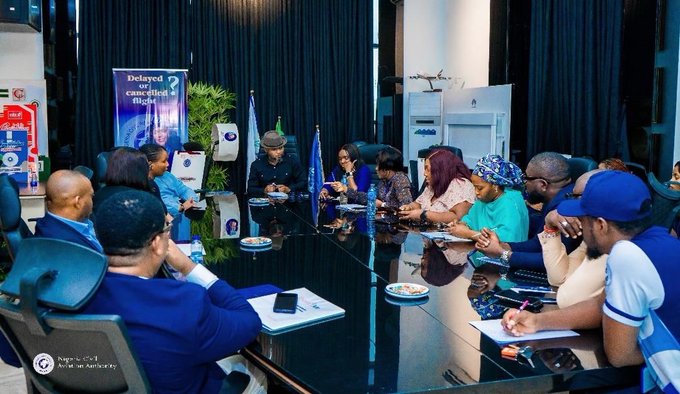
|
Getting your Trinity Audio player ready...
|
The August 10, 2025, incident between Comfort Emmanson and the Ibom Air crew quickly became viral not only because of the altercation but also due to the way Emmanson was handled, including partial stripping that exposed her chest.
When Comfort Emmanson boarded her Ibom Air flight, she didn’t imagine her journey would end with humiliation, a viral video, and strangers dissecting her body on social media.
The video now circulating online shows a visibly distressed Comfort being handled roughly. For many women, watching it feels like a punch to the gut, not just because of the airline staff’s lack of professionalism but also because of what follows.
In the aftermath, veteran actress Kate Henshaw captured the real issue when she tweeted,
“Tallest, the video is bad. That it is even circulating is terrible at best. Decorum is a thing. Handling people at the height of any emotion is a skill not many professionals in the service industry have.” In another statement, she said, “I always advocate for ladies to wear a good, supportive bra. It is essential. You never know when a situation like this might occur!! This was not good at all.”
But alongside this, posts like these began trending:
“In the same way we advise boys to always put on neat boxers in case of any incident, especially when in Army camouflage, now we also need to advise ladies to put on a bra in case of an emergency,” Don Macduff said!
“Stop going pantless and braless,” filmmaker Biodun Stephen tells women, using the lbom Air lady as a case study.
These statements frame the bra as a moral duty rather than a personal clothing choice, shifting blame from the aggressor to the victim. These tweets imply that Comfort’s treatment resulted from her clothing choice, rather than the unprofessional conduct of airline staff. This reinforces a harmful culture where women are told to “prevent” harassment instead of demanding that perpetrators stop harassing.
Comparing bras to neat boxers is misleading. Underwear visibility in men is rarely sexualised or used to justify public humiliation. Women’s clothing, however, is often sexualised and scrutinised, making this comparison unfair.
A bra is not a compulsory item of clothing for women; it is a personal comfort choice. No health regulations, aviation laws, or workplace safety codes in Nigeria (or internationally) mandate women to wear bras in public or on flights. Medical studies have found no conclusive link between not wearing a bra and any health hazard.
The idea that women must wear bras in case of an emergency mirrors the same policing logic often used to shame women for their appearance, shifting the blame from inappropriate treatment to the victim’s clothing choices. This is a form of gender-based stereotyping that ignores the root problem: respect and dignity in service interactions.
A bra is not a legal requirement nor essential for decency. Many women choose not to wear bras for health, comfort, or personal reasons. Suggesting it is mandatory infringes on bodily autonomy.
The core issue here was how Comfort was treated, not whether she met someone else’s dress code. Staff in service industries should be trained to manage situations with empathy, discretion, and respect, regardless of attire.
What Comfort Emmanson experienced was not a wardrobe failure but a failure of professionalism, empathy, and human dignity. It’s not Comfort’s outfit; it’s the breach of her dignity and customer rights. Many online reactions centre on morality policing rather than professional misconduct. It fuels public shaming and can cause emotional and reputational damage to the victim.
Wearing a bra is not a societal obligation. Comfort’s treatment on Ibom Air was unjustifiable, and media consumers must learn to separate appearance-based bias from the right to respectful service.
According to the Nigerian Bar Association, Ibom Air’s treatment of Emmanson was “reckless” and violated her fundamental rights. In any professional environment, staff are trained to de-escalate conflict without physical harm, unnecessary exposure, or humiliation—safety protocol concerns procedures and respect, not passengers’ underwear choices.
Experts Agree
In reaction to this disheartening issue, a gender advocate and business person, Akuchi Precious, expressed that,
“It is her body, and she has the right over her body; not wearing a bra is not stated in the law; therefore, all women should be allowed to do as they please with their body, and it is never a reason to be harassed like that in such an indecent manner”,
Similarly, Women’s Rights Advocate Naija Feminists Media founder, Simbiat Bakare, further explicated,
“Bra-wearing is a matter of personal preference, not a measure of modesty or decency. Clothing provides sufficient coverage, and bras primarily serve an aesthetic purpose, offering no significant health benefits. Women should prioritise comfort and wear what makes them feel good.
“The real issue regarding Comfort lies in the violation of human rights, such as forced exposure or harassment, rather than the presence or absence of a bra. Focusing on bra-wearing as a moral issue reflects a deeper problem of controlling women’s bodies and perpetuating misogyny,” Simbiat said.
Similarly, Izzy Ogbeide, a Facebook user, defends Comfort Emmanson that wearing a bra is not a necessity, and does not indicate immorality. Users agree with the post: “To wear bra na by force, now wey bra dey cost pass clothes, whose business is it on how she dresses?” Mhiz Pearl commented.
On this note, when consuming viral stories, we must ask: What is the main issue? Airline mishandling of conflict and violation of dignity. What is being used to shift attention, using bras as a preventive measure? Who benefits from the shift: institutions avoiding accountability. Who loses? Women, whose comfort and bodily autonomy are now up for public debate.
Conclusion
Wearing a bra is optional and irrelevant to whether someone deserves respectful treatment in public. The Ibom Air case should raise more conversations about professional safety standards and respect for human dignity, not policing women’s clothing.







Nice one 👍🏻